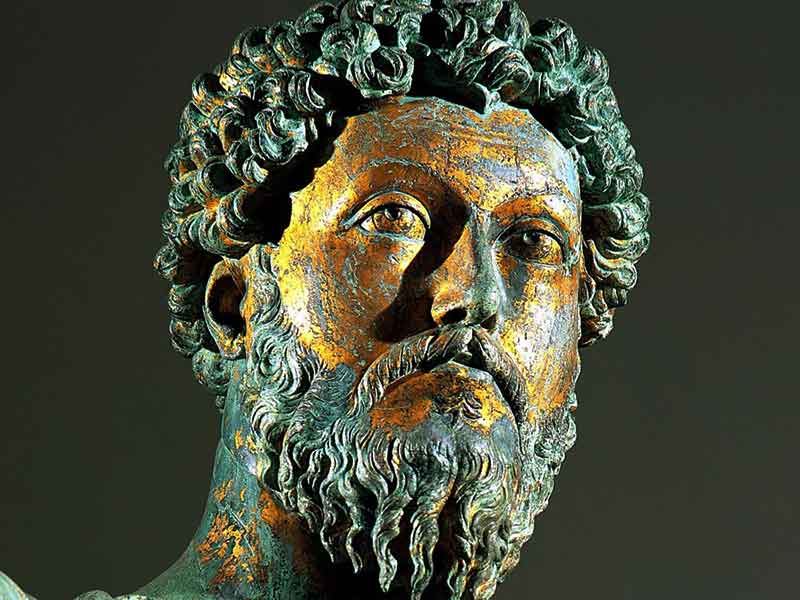Proud to introduce to you Emperor Marcus Aurelius
Emperor Marcus Aurelius
Marcus Aurelius, born Marcus Annius Verus, was a Roman emperor who ruled from 161 to 180 AD.
He is best known for his philosophical work "Meditations" and his leadership during challenging times.
Here are some of his notable achievements:
Birth
26 April 121 AD, Rome, Italy
Death
17 March 180 AD, Sirmium
Known for
His book "Meditations"
Successful Defensive Wars
Marcus Aurelius managed to successfully wage a series of defensive wars across the Roman Empire. He led campaigns against Germanic tribes, such as the Marcomanni, Quadi, and Sarmatians, and achieved significant victories.
Imperial Administration
Marcus Aurelius was known for his expertise in imperial administration. He worked to improve the efficiency of the empire and implemented legal reforms to promote justice and fairness.
Philosophical Legacy
One of Marcus Aurelius' greatest accomplishments was his philosophical writings known as "Meditations." This work, which he wrote for his personal reflection, has had a lasting impact on philosophy and self-improvement.
Leadership during Challenging Times
Marcus Aurelius faced various challenges during his reign, including the Antonine Plague. He took measures to address the pandemic and demonstrated compassion for his people.
Legacy of Wisdom
Marcus Aurelius' quotes from "Meditations" continue to inspire individuals seeking wisdom, resilience, and inner peace. His teachings have influenced countless people throughout history.
Role in the spread of Christianity
The role of Marcus Aurelius in the spread of Christianity in the Roman Empire is a topic of debate among historians. While there is no definitive evidence of his direct involvement or specific policies towards Christians, some observations can be made based on historical records:
Increased Persecution: It is noted that the persecution of Christians in the Roman Empire increased during Marcus Aurelius' reign.
However, it is important to note that the persecution of Christians was not solely directed by the emperor but often carried out by local Roman officials.
Lack of Direct Involvement: There is no record of Marcus Aurelius personally instigating or actively persecuting Christians.
Some scholars argue that the persecution was a result of local officials' actions rather than a deliberate policy of the emperor himself.
Stoic Philosophy: Marcus Aurelius was a Stoic philosopher and emphasized the importance of virtue and duty. His philosophical beliefs may have influenced his views on religion and religious tolerance.
Emphasis on Traditional Roman Religion: Marcus Aurelius emphasized the importance of traditional Roman religion and viewed it as a key component of stability and order within the empire.
This focus on traditional religion may have indirectly affected the treatment of Christians.
In summary, while Marcus Aurelius' reign witnessed an increase in the persecution of Christians, his direct involvement or specific policies towards Christianity remain unclear. The persecution was likely carried out by local officials, and the emperor's Stoic philosophy and emphasis on traditional Roman religion may have indirectly influenced the treatment of Christians.
Emperor Marcus Aurelius summary
Despite the challenges he faced, Marcus Aurelius left a lasting legacy as a wise and respected philosopher-emperor.
His writings and leadership during difficult times have made him an influential figure in Roman history and beyond.

Content created by:
Alex Costin
Results driven services:
Digital Marketing
Need my expertise?
Contact me
No tracking cookies!
General information purposes only!
Business partners offers (backlinks):
Search Engine Optimisation agency:
SEO
Explore this city secret guide:
Barcelona
Outdoor recreational activity:
Canyoning
Wide range of financial services:
Chartered Accountant
Copyright © 2023 Alex Costin